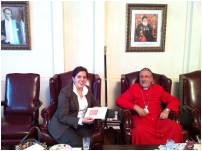10th December 2012
Human Rights – Inspiration in Turkey
A guest blog by Nadia Hashmi, Second Secretary for internal politics and human rights at the British Embassy in Ankara, Turkey
On 10 December 1948 the United Nations adopted the Universal Declaration of Human Rights, and the day has been celebrated around the world ever since.

Turkey ratified the European Convention on Human Rights on 18 May 1954. Over the past ten years the country has made considerable progress on human rights, reflecting its commitment to joining the European Union.
It has abolished the death penalty, improved prison conditions, relaxed the ban on using Kurdish language and passed legislation to eliminate violence against women. The promised new constitution offers a once-in-a-generation opportunity to further enshrine human rights into Turkey’s legal and public life.
The UK is a firm supporter of Turkey’s human rights reforms. Judicial independence, good governance and effectively implemented legal reforms that comply with international standards are vital. The British Embassy in Ankara has supported training workshops and study visits to raise awareness about women’s rights, lesbian and gay rights and to protect Turkish women from violence and discrimination.
We’re keen to work with Turkish partners in this area, and will shortly be inviting non-governmental organisations to bid for funds to help them meet their objectives. Even small sums of money can have a big impact, as we’ve found recently with our sponsorship of a women’s centre in Van to help victims of last year’s earthquake access social support.

The most rewarding part of my job is meeting the dedicated Turkish people who aspire to ensure fundamental freedoms for their country: activists, parliamentarians, volunteers, community leaders and academics.
As in many countries, many get no recognition or even salary, but continue their work tirelessly. Seeing their work gain a higher profile, and how this in turn helps people to lead lives free from the threat of discrimination, is inspiring.
I recently asked influencers in Turkey to contribute to a social media project on the International Day for the Elimination of Violence and was impressed at how many opinions we gathered.
Turkey continues to be an important partner for both the UK and for Europe. A clear roadmap of human rights reforms is vital for its future and our regional stability. I feel fortunate to be working with Turkey on its continuing reform journey.
Hi Nadia
This is all positive information that you are reporting, however, there is a long way to go-see (excerpt from Hurriyet) below.
Turkey has more journalists in jail than any other country, followed by Iran and China, the U.S.-based Committee to Protect Journalists (CPJ) said yesterday.
There are 49 journalists in prison in Turkey as of Dec. 1, including dozens of reporters held on terrorism-related charges and other journalists accused of plotting against the government, according to the watchdog. Although the number is lower that the group’s presvious report on the country, which said there were 61 journalists in prison, Turkey still tops the list.
Iran had jailed at least 45 journalists by the start of this month, followed by China with 32, the report said.
In all, the group identified 232 writers, editors and photojournalists imprisoned as of December 1, a “snapshot” that does not include many journalists imprisoned and released over the course of the year, it said.
The total marked an increase of 53 from the same day in 2011 and the highest since the organization began its survey in 1990.
The previous record of 185 journalists imprisoned worldwide was set in 1996.
Rounding out the top five jailers of journalists were Eritrea, with 28 reporters behind bars, and Syria, with 15.
They were followed by Vietnam (14), Azerbaijan (9), Ethiopia (6), Saudi Arabia (4) and Uzbekistan (4). The group identified a total of 27 countries as imprisoning journalists.
The number of journalists in prison reached a record high this year, as critical reporters and
editors were charged with “terrorism” and other crimes against the state, the New York-based group said.
“We are living in an age when anti-state charges and ‘terrorist’ labels have become the preferred means that governments use to intimidate, detain, and imprison journalists,” CPJ Executive Director Joel Simon said in a statement.
“Criminalising probing coverage of inconvenient topics violates not only international law, but impedes the right of people around the world to gather, disseminate, and receive independent information.”